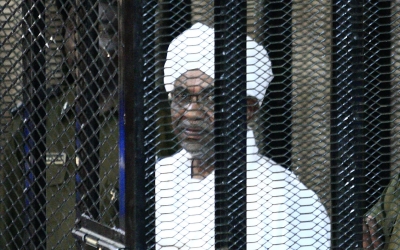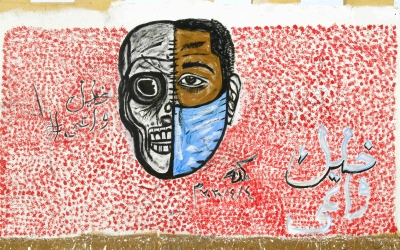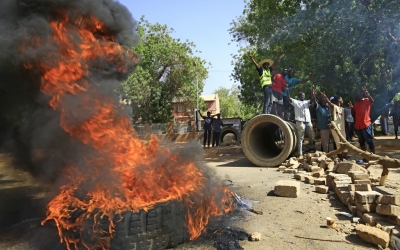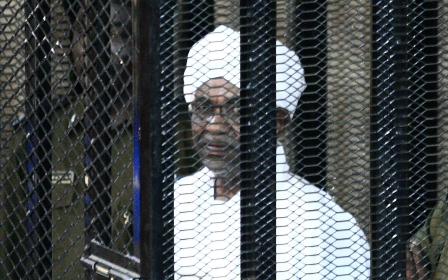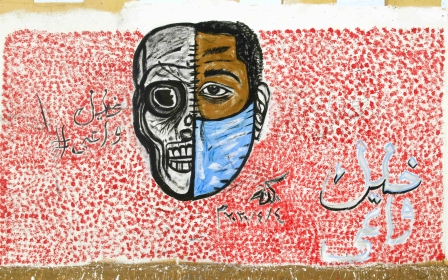Coronavirus spreading through Sudan prison holding Bashir and his allies
The coronavirus is continuing to spread in Khartoum's Kober prison where ousted president Omar al-Bashir and 23 of his assistants have been detained since April 2019.
At least three former senior officials currently have the virus, with two more awaiting test results amid conflicting reports that the 77-year-old former leader is suspected of having the virus and has been isolated.
The former ruling party, as well as the prisoners' families and defence team, have said they hold the transitional government responsible for any harm that may come to the inmates, as sources say Bashir's supporters are organising marches in the capital and other states to protest against what they described as the "unconstitutional detention" of the leaders.
Authorities say the prisoners have been dealt with in a professional manner and that international standards regarding medical protocols have been adopted in the prison.
Following Middle East Eye's report last month that Ahmed Haroun, an assistant to Bashir and chairman of the former ruling party, had contracted the virus, Sudan's prosecutor general said in a press release on Wednesday that former first vice president Ali Osman Mohamed Taha and former defence minister Abdul Rahim Mohamed Hussein had also been infected.
The statement said the two men had been admitted to hospital on Monday.
The prosecutor general said Ali Hassan Ahmed al-Bashir, a brother of the president, had been suspected of contracting the virus, along with another businessman linked to Bashir's former government, but that their test results had been negative.
The statement said two other former Bashir government figures were awaiting test results, without naming them.
Abdallah Hassan Ahmed al-Bashir, another of Bashir’s brothers, is also in the hospital but due to another disease, the statement said, without elaborating.
Two other inmates, former Bashir advisor Ibrahim al-Sanosi and another prominent figure Ali al-Haj have been hospitalised for other diseases.
Alsharif Ahmed Omer Badur, a former leading member of Bashir's government, died in hospital after he was infected in the prison.
Bashir confusion
Contradictory reports have emerged regarding the former president's situation, with one report claiming Bashir was depressed and had rejected a test.
However, a medical source told MEE that there were suspicions that Bashir had the virus and that a sample had been taken from him.
"Ousted president Omar al-Bashir is suspected because all 23 prisoners were praying together in Kober prison... ," the source said under condition of anonymity because he was not authorised to talk to the media.
"A laboratory sample has been taken from him, and he is waiting for the result."
However, Mohamed al-Hassan al-Amin, the head of Bashir's and the other prisoners' defence team, said that Bashir had not been diagnosed as positive and no sample had been taken from him.
"Bashir has been isolated from the others after the first confirmed case in the prison, but so far no symptoms have appeared on him," Amin told MEE.
Bashir and the other detainees are accused of a range of crimes, including involvement in the country's 1989 military coup, the killing of protesters and corruption.
Accusations
Amin accused authorities of neglecting demands from the prisoners and their defence team, as well as their families, to refer them to hospitals or to isolation at home.
"We have asked the prosecutor general many times to free them with guarantee, as they did with many prisoners, even some of whom were sentenced to death for serious crimes, so there is clear discrimination against Bashir and other political prisoners, especially since most of them are more vulnerable to infection from Covid-19 because they are above 70," he said.
Amin said that Abdallah Hassan Ahmed al-Bashir, the brother of the ousted president, was in critical condition as he already had cancer and had been hospitalised a few days ago.
"The prosecutor general and all the authorities, including the ministry of health, have intentionally delayed any response to our repeated requests to temporarily release them, or at least put them under house arrest. But they are now responsible for the deterioration of their health because they are in their hands," he said.
"We have been told that the social distancing has not been adopted, as four to five persons are held in each cell."
'Prisoners have received good medical care'
Despite Amin's accusations, the prosecutor general's office said that all of the prisoners were receiving good treatment and full access to medical treatment and that international standards regarding medical protocols have been adopted in the prison.
"The prosecutor general is fully responsible for the safety of the prisoners that are awaiting investigation," a statement from the prosecutor general's office said.
"The general prosecutor, along with the prison and police authorities, and in addition to the civil defence, are fully in charge, implementing all instructions and medical protocols received from the Ministry of Health.
"We did sanitise the cells of the prison, distanced the prisoners, and took confirmed cases to the isolation centres outside the prison, also the other medical cases among the prisoners have received good medical care," it added.
Minister of Health Akram Ali Altoum was contacted by MEE but declined to comment on the developments.
Marches planned
The prisoners' families and the now-dissolved former ruling party say they hold the transitional government responsible for any harm to the prisoners.
A former ruling party member, who asked for anonymity, told MEE that they were preparing to hold marches in the coming days to protest against the treatment of their former leaders by the transitional government.
Meanwhile, the prisoners' families accused the prosecutor general of using various tactics to keep the leaders in prison for a longer time.
"The prosecutor general is actually manoeuvering against us, gaining time to let the prisoners stay longer in prison," the families claimed in a statement.
Prosecutor general Taj Alsir Alhibir has accused associates of the former ruling party of attempting to confuse public opinion, stressing that his office has assisted prisoners with the different kinds of health care they need.
"The prosecutor general has sent orders to all heads of the sub-attorneys to provide full health care to all the prisoners, and that is what happened," he said.
Activists on social media said they regretted the infections of the former leaders of the ruling party, since those officials had committed many crimes and they were still waiting to see them in court in order to exact justice.
The number of confirmed coronavirus cases in Sudan has reached 4,346, with 749 recoveries and 195 deaths.
Middle East Eye delivers independent and unrivalled coverage and analysis of the Middle East, North Africa and beyond. To learn more about republishing this content and the associated fees, please fill out this form. More about MEE can be found here.


